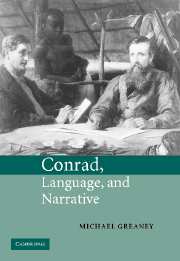Conclusion
Published online by Cambridge University Press: 22 September 2009
Summary
My decision to use Under Western Eyes as the final case-study of this book has a twofold origin: first, in my sense that this singularly comfortless meditation on the dangers and limitations of language is the most ‘typical’ novel in Conrad's oeuvre – in much the same way that Tristram Shandy was, for Victor Shklovsky, ‘the most typical novel in world literature’. Under Western Eyes crystallizes the fear and distrust of language that is more definitively ‘Conradian’ than any of the more familiar trappings of his fiction: the world of ships and sailors and the sea, or the grafting of psychological drama onto exotic travelogue. In its obsession with its own textual ontology, Under Western Eyes directly confronts the issues of language, voice, and textuality that Conrad, elsewhere in his work, sought ever more resourcefully to evade; it is the novel he was trying not to write throughout his career. Victory and Lord Jim in particular might be seen as abortive drafts of Under Western Eyes, the former retreating into antiseptic omniscience, and the latter relocating to Patusan, in order to evade the deconstructive logic the text has set in motion.
My second reason for privileging Under Western Eyes is that it offers an excellent vantage-point from which to reflect on Conrad's problematic modernism. I have argued in this study that the generative paradox of Conrad's fiction is that it can be grasped both as an extremely belated rearguard action against print culture and as a precocious adumbration of high-modernist textuality.
- Type
- Chapter
- Information
- Conrad, Language, and Narrative , pp. 167 - 169Publisher: Cambridge University PressPrint publication year: 2001



